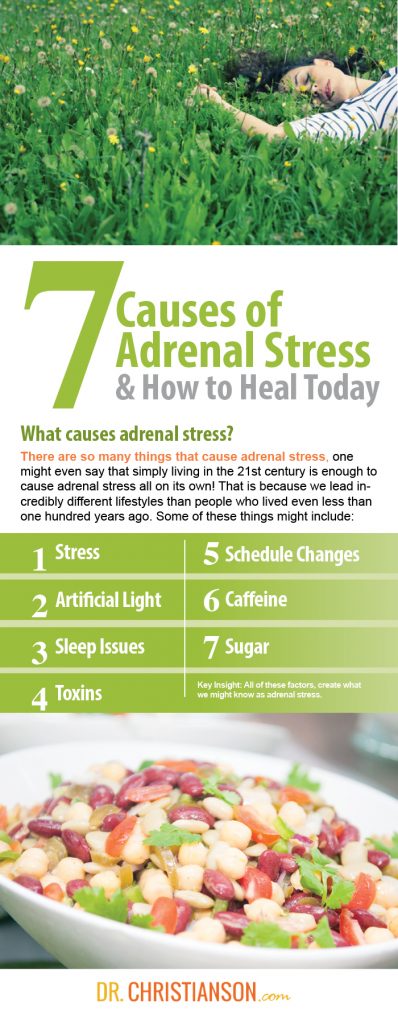Is it possible to heal your adrenals with simple foods? I’m Dr. Alan Christianson, and I want to talk to you about your adrenals and how you can change your life for the better. Let’s dig in, and I will show you some easy, ways that The Adrenal Fatigue Reset Diet (and the Adrenal Reset Diet Quiz) can change your life.
- Have any questions?
- 480-767-9018
- support@in-goodhealth.com

8 Ways To Heal Hashimoto’s Today
June 12, 2017
Is The Paleo Diet Really Paleo?
July 14, 2017
8 Ways To Heal Hashimoto’s Today
June 12, 2017
Is The Paleo Diet Really Paleo?
July 14, 2017Home > Weight Loss > 7 Causes of Adrenal Stress and How You Can Eliminate Them
7 Causes of Adrenal Stress and How You Can Eliminate Them

Product Recommendation: The Daily Reset Shake Immune Boost Bundle helps boost your immune through healthy protein, micronutrients and resistant starch. Click Here
Adrenal Fatigue and Adrenal Stress
I have talked before about how I want to rename adrenal fatigue. That is why I want to start off our conversation today talking about this key difference.
There’s one main thing I don’t like about the term “adrenal fatigue.” That is I think it’s misleading.
The term itself implies that our adrenals are somehow weaker than before. That they are fatigued and less able to perform. There are diseases which render the gland unable to produce hormones. For most of us, this is just not the way they work.
Key Insight: Your adrenal glands might be overactive or underactive, but it does not mean that they are broken – or that they are fatigued!
What is actually happening is that your body is trying to control your adrenals, so that it can heal itself. This is why the term “adrenal stress” is much more appropriate.
In a perfect world, I would call it hypothalamic–pituitary–adrenal dysregulation. But for now we will just go with something simple “adrenal stress.”
What stage are your adrenals at? You can take the Adrenal Quiz by clicking HERE
7 Causes of Adrenal Stress
There are so many things that cause adrenal stress. One might even say that simply living in the 21st century is enough to cause adrenal stress all on its own! That is because we lead incredibly different lifestyles than people who lived even less than one hundred years ago.
Because of this, there are many factors which would be leading to adrenal stress. Some might include:
Stress
Stress can cause the adrenal glands to produce stress hormones such as cortisol, leading to adrenal stress.
Toxins
Exposure to toxins such as heavy metals or environmental pollutants can cause the adrenal glands to work harder to detoxify the body, leading to adrenal stress.
Schedule changes
Sudden changes to a person’s schedule or routine can disrupt the body’s natural hormonal rhythms and lead to adrenal stress.
Artificial light
Exposure to artificial light at night can disrupt the body’s production of melatonin, a hormone that helps regulate sleep, leading to sleep issues and potentially adrenal stress.
Caffeine
Consuming caffeine can stimulate the production of stress hormones and lead to adrenal stress.
Sugar
Consuming large amounts of sugar can cause blood sugar spikes and crashes, leading to adrenal stress.
Sleep issues
Chronic sleep deprivation or poor sleep quality can lead to adrenal stress.
Bottom Line: All of these factors, collectively, create what we might know as adrenal stress. The problem with them is that they are simply how we lead our lives. We don’t go to sleep by candlelight anymore, and all of these environmental changes can also lead to changes in our health. Sometimes for the better, but sometimes for the worse, too.
What are the risks of adrenal stress?
There are plenty of risks associated with adrenal stress. It can:
- Shorten our lifespan
- Expand our waistlines
- Premature fast aging of the skin and immune system
- Hurt our brain and our mood
Adrenal stress is also a large factor in triggering thyroid disease in our bodies. So, what we want to do is make sense of it and manage it properly – for our short term and our long term health.
While we might not be able to wave a magic wand and eliminate all of those adrenal stressors, there are things we can do to make change. So, I put a lot of thought into how we could reverse some of these things and take our lives back.
The Role of Cortisol

It is so important to know about the role that cortisol plays in our bodies. This is especially true in the case of weight management.
When we have too much of it, or we are making it at the wrong times, our bodies can go into a “storage mode.” In this mode, our bodies start holding onto calories in the form of visceral fat.
Key Insight: When we retain the visceral fat that our bodies could have been burning off, we instead create inflammation and harm for our bodies in the long-term.
Our bodies work in a system of checks and balances. This means that when something is “off” there is typically a reaction to fix that problem.
Cortisol is one of those fixers that helps us when our blood sugar gets too low, and where we might otherwise go into a coma. I don’t want to make cortisol out to be the enemy, but I do want you to understand how “reckless cortisol” circulating through your body can cause trouble for you.

Bottom Line: Cortisol has the unintended consequence of causing stress upon our bodies which can lead to adrenal stress and all of those unfortunate problems. When we can keep our cortisol in check, we can keep our bodies fit and away from inflammation – which can help us recover and thrive.
How can our diet “reset” our adrenals?
There’s actually a simple concept that I have come up with. You might have heard me talk about before, called “carb cycling” that can help reset your adrenals.
It is based on the idea that when your blood sugar drops, and your cortisol rises, that we can use that to our advantage.
Within the diet, we have:
- Fats – which have neither a good or bad effect on cortisol
- Protein – which has a small effect on cortisol
- Carbohydrates – which has the most dramatic effect on cortisol
Key Insight: The main function of this diet is to have your cortisol high in the morning, low in the evening and lowest throughout the evening.
In order to achieve those kinds of results, I needed to come up with meals which helped support – and regulate – cortisol throughout the entire day.
The typical morning started with a lower carbohydrate, good protein, and healthy fat based meal.
Why the lower carbohydrates?
Well, when we enjoy carbs we are actually pushing down cortisol production in our bodies.
While this might be better later in the day, in the morning it actually would make us feel less alert and less sharp. That’s something we want to avoid, so we need lower carbs in the morning.

There are some folks who might tell you that carbohydrates are better consumed in the morning because you have the entire day to burn them off.
While that might make intuitive sense, it is not the way our bodies work. There is actually time between eating and burning that occurs in our bodies, unlike a car, which immediately starts burning gas the moment you fill it up.
The Role of Carbohydrates Grows
The next couple of meals is where we see the role of carbohydrates growing. During these meals, I kept proteins and fats the same, while increasing the amount of carbohydrates.
This is where that idea of consuming carbohydrates to be burned is more important. When we burn carbs throughout the day, for energy, we are typically burning them from yesterday evening’s meals – not the ones first thing in the morning.
With this in mind, simply adding more and more carbs at night is not the answer – the same way that overeating foods is almost never the answer.
Any time that you add something like fat, protein or carbohydrates to your diet, you can experience weight gain. Overall, though, if you are on a good balance of overall caloric consumption, more carbs at night can serve you in better ways.
Bottom Line: One of the main pitfalls of low carbohydrate diets is what we might call a “cortisol imbalance” – where cortisol simply gets too high because we aren’t managing it with cortisol-friendly foods, the kind that helps us regulate cortisol throughout the day.
What are the results of this diet?
In my own program, I have actually seen a big shift in cortisol metabolism. This has led to people reaping the following benefits in:
- Weight loss
- Visceral fat loss
- Depth of sleep
- Overall Energy
Bottom Line: All of these benefits make total sense when we understand how that cortisol cycle works.
What amounts should I be eating?
In terms of amounts, you want to think about the following throughout the day:
- 1/4 cup of good carbohydrates for breakfast
- 1/2 cup for lunch
- 3/4 cup for dinner
Sounds simple, right? Well, it definitely is! This is all for the purpose of setting your body up to achieve good cortisol rhythms throughout the day and night.
What is a “good” carbohydrate?
I love talking about all of the good carbohydrates that we can get into our system – they can be simple to work with, easy to work into your diet and absolutely delicious, too. What are some examples of good carbohydrates? Good carbohydrates include these key characteristics:
- Slow absorption
- Large amounts of fiber
- Some level of resistant starch
Key Insight: Have you thought about meal replacement shakes? These can be a great way of getting these forms of carbohydrates, like resistant starches, into your diet quickly and easily.
Other great types of foods would be:
- Potatoes
- Beans and legumes (especially white beans)
- Intact whole grains (like buckwheat)
- Vegetable starches (like squash)
Bottom Line: Overall, you are going to want to get good, dense carbs into your diet. A little bit for breakfast, a little more for lunch and even more for dinner. Once you follow that program, you will be on your way to resetting your cortisol rhythm and feeling better right away.
Lost Touch With Your Personal Health?
Do you feel like you have lost touch with your personal health? Get to know a little bit more about yourself, and where you stand, by taking the Thyroid Quiz today (Click Here).
It is sure to give you a better understanding of how you are feeling, and what you might be dealing with. Take it today, and start feeling better right away.
What stage are your adrenals at? Start by taking the Adrenal Fatigue Stage Quiz HERE. From there, you can begin to see the changes the Adrenal Fatigue Reset Diet can make in your life.
7 Causes of Adrenal Stress


P.S. Whenever you are ready, here is how I can help you now:
- Schedule a Thyroid Second Opinion with me, Dr. C, Click Here for Details
- Need help to choose supplements? Click ‘Help Me Decide Here'
- Get my top books Here
Dr. Alan Glen Christianson (Dr. C) is a Naturopathic Endocrinologist and the author of The NY Times bestselling Hormone Healing Cookbook, The Metabolism Reset Diet, and The Thyroid Reset Diet.
Dr. C’s gift for figuring out what works has helped hundreds of thousands reverse thyroid disease, heal their adrenals, and lose weight naturally. Learn more about the surprising story that started his quest.






